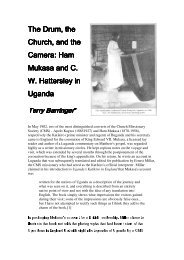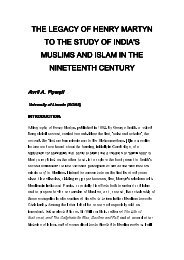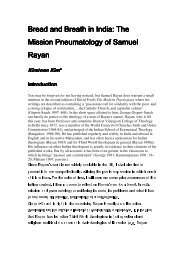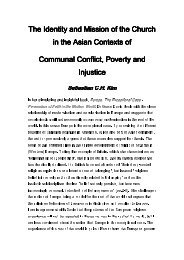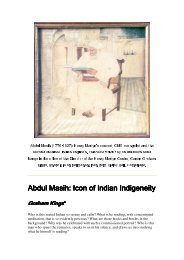deeply imbued with the spirit <strong>of</strong> Pietism and had been molded by the discipline and religious seriousness <strong>of</strong> the Basel Institute. His letters and journals are full <strong>of</strong> religious comment that rises above mere platitude by reason <strong>of</strong> the difficult and sometimes dangerous circumstances in which they were written, even though expressed in somewhat clichéd terms. But the man was is difficult to discern; to some extent he is masked by his words rather than revealed through them. Whatever the success or otherwise <strong>of</strong> his work, the Anglican Church <strong>of</strong> the Province <strong>of</strong> Kenya (CPK), which celebrated its first century and a half <strong>of</strong> existence in 1994, looks back to him as its founder. In the volume produced to himself this occasion, Rabai to Mumias, <strong>Krapf</strong> and Rebmann and their companions occupy most <strong>of</strong> the first eleven pages <strong>of</strong> chapter 1. Photographs <strong>of</strong> both men are included. That they were Lutherans rather than Anglicans is mark * M. Louise Pirouet lectured in church history and African Christianity at Makerere University, Kampala, Uganda, and Nairobi University, Kenya, before returning to Britain, where she lectured in religious studies at Homerton College, University <strong>of</strong> Cambridge, until her retirement. mentioned. It is important to the CPK that these early missionaries did not high-handedly condemn African customs without understanding them and that their standard <strong>of</strong> living was simple and close to that <strong>of</strong> the people they lived among, unlike later missionaries whose standard <strong>of</strong> living distanced them from ordinary Africans.[26] For modern Kenyan Christians, <strong>Krapf</strong> was an barely missionary pioneer. Notes outstanding 1. I am indebted to Paul Jenkins and Patricia Purtschert (Basel Mission Archives), Alan Jesson (Bible Society Archives, Cambridge Univ. Library), and Pr<strong>of</strong>essor Roy Bridges for help in preparing this article. 2. Eugene Stock, <strong>The</strong> History <strong>of</strong> the Church Missionary Society: Its Environment, Its Men, and Its Work, 3 vols. (London: CMS, 1899), 2:135. 3. Roland Oliver, <strong>The</strong> Missionary Factor in East Africa (London and New York: Longmans, Green, 1952), p. 6. 4. C. P. Groves, <strong>The</strong> Planting <strong>of</strong> Christianity in Africa, vol. 2, 1840-1878 (London: Lutterworth, 1954), pp. 116-17. 5. Adrian Hastings, <strong>The</strong> Church in Africa, 1450-1950 (Oxford: Clarendon Press, 1994).
6. R. C. Bridges, introduction to J. L. <strong>Krapf</strong>, Travels, Researches, and Missionary Labours in East Africa (London: Frank Cass, 1968; orig. ed., London: Trübner, 1860), p. 65. 7. Jon Miller, <strong>The</strong> Social Control <strong>of</strong> Religious Zeal (New Brunswick, N.J.: Rutgers Univ. Press, 1994), pp. 21-22. 8. <strong>Krapf</strong>, Travels, p. 2. 9. <strong>Krapf</strong> refers to this as the Anatolian School. <strong>The</strong> school was named after the Österberg, a hill east <strong>of</strong> Tübingen. This school taught Greek as well as Latin, hence the name was sometimes given as Anatolishe Schule (Greek en to anatole, "in the east"). I am grateful to Dr. H. Ehmer <strong>of</strong> the archives <strong>of</strong> the Evangelische Landeskirche in Württemberg for elucidating this point for me. 10. <strong>Krapf</strong>, Travels, p. 10. 11. Information prepared by H. Bächtold, Missionssekretär, Basel Mission, 1966. 12. CMS, A Register <strong>of</strong> Missionaries and Native Clergy, 1804-1904 (London: CMS, 1905), p. 43. See also "Fjellstedt, Peter," in Biographical Dictionary <strong>of</strong> Christian Missions, ed. Gerald H. Anderson (New York: Macmillan, 1998). For connections between Basel and the CMS, see Paul Jenkins, "<strong>The</strong> Church Missionary Society and the Basel Mission: An Early Experiment in Inter- European Co-operation," in CMS and World Christianity, 1799-1999, ed. K. Ward and B. Stanley (London and Grand Rapids, Mich.: Curzon Press and Eerdmans, 1999). 13. <strong>Krapf</strong>, Travels, pp. 9, 11. Additional information about <strong>Krapf</strong>'s early life is contained in a three-page summary prepared by H. Bächtold, archivist <strong>of</strong> the Basel Mission, 1966. 14. <strong>Krapf</strong> to H. Knolleke, March 3, 1860, Bible Society Archives (BSA), Cambridge Univ. Library, Editorial Correspondence Inwards 2. 15. <strong>Krapf</strong> to Coates, copied to BFBS, February 20, 1841, BSA, Foreign Correspondence Inwards 3. 16. Stock, History <strong>of</strong> the CMS, 1:227-28; entry for August 27, 1839, Journals <strong>of</strong> the Rev. Mersers Isenberg and <strong>Krapf</strong>. (Reprint, Journals <strong>of</strong> C. W. Isenberg and J. L. <strong>Krapf</strong>, London: Frank Cass, 1968.) <strong>The</strong> printing <strong>of</strong> a parallel-text edition was finally seen through the press by <strong>Krapf</strong> in 1876 (BSA, Editorial Correspondence Inwards 12). 17. Journals, p. 138. 18. An example <strong>of</strong> his first Kiswahili translation is found in Church <strong>of</strong> the Province <strong>of</strong> Kenya, Rabai to Mumias (Nairobi: Uzima Press, 1994), pp. 5-7. 19. Bächtold, 1966. Basel Archives. By this time <strong>Krapf</strong> seems to have lost touch with the CMS. 20. "Wakefield, Thomas," in Biographical Dictionary <strong>of</strong> Christian Missions. 21. Bridges, introduction to Travels, pp. 50-51. 22. Ibid., pp. 47-48. 23. <strong>Krapf</strong> to Secretary <strong>of</strong> the BFBS, February 21, 1867, BSA, Editorial Correspondence Inwards 5. 24. Because his letters were sometimes copied by one society to the other, they may figure more than once. 25. See, for instance, Bahru Zewde, A History <strong>of</strong> Modern Ethiopia, 1855-1974 (London: James Currey, 1991); J. de Vere Allen, Swahili Origins (London: James Currey, 1993); Justin Willis, Mombasa, the Swahili, and the Making <strong>of</strong> the Mijikenda (Oxford: Clarendon Press, 1993). 26. Rabai to Mumias, pp. 8-10.



